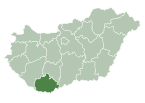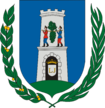Siklós
Ottoman conquest
During Sultân Süleymân's 1543 campaign into Hungary, the Ottoman army first took Valpovo, in Slavonia, on June 23. Süleymân then sent his army north of the Drava River to take Siklós, which belonged to the Perényi family [hu], who, during the civil war raging in Hungary, was on the side of King Ferdinand I of Habsburg. Either on June 24 or 25, Siklós was given an opportunity to surrender but the garrison, led by castellan Mihály Vas, refused. On June 26, Siklós was besieged, bombarded, and attacked but the garrison stood strong. While Siklós was besieged, representatives from Pécs arrive and surrender the city. On July 6, after 3,000 cannonballs had hit the fortress, the garrison surrendered, and Süleymân entered the city the next day. From Siklós, the Sultân marched to Pécs. After 143 years of Ottoman rule, Siklós was liberated on October 30, 1686. [hu]
Notable people
- George Mikes, British author most famous for his humorous commentaries on various countries
- Albert Siklós, composer
- Rudolphus de Benyovszky, violinist and composer
Twin towns – sister cities
Siklós is twinned with:
 Aiud, Romania
Aiud, Romania Donji Miholjac, Croatia
Donji Miholjac, Croatia Feldbach, Austria
Feldbach, Austria Fornovo di Taro, Italy
Fornovo di Taro, Italy Moldava nad Bodvou, Slovakia
Moldava nad Bodvou, Slovakia
Gallery
-
Franciscan Church of Máriagyüd
-
Malkocs Bey Mosque
-
Town hall
References

- ^ von Hammer-Purgstall, Joseph (1836). Histoire de l'Empire ottoman, depuis son origine jusqu'à nos jours (in French). Vol. 5. Paris. pp. 366–367.
- ^ Thúry, József (1896). Török történetírók (in Hungarian). Vol. 2. Budapest: Magyar Tudományos Akadémia. pp. 302–310.
- ^ "Testvérvárosok". siklos.hu (in Hungarian). Siklós. Retrieved 2021-04-10.
External links
![]() Media related to Siklós at Wikimedia Commons
Media related to Siklós at Wikimedia Commons




